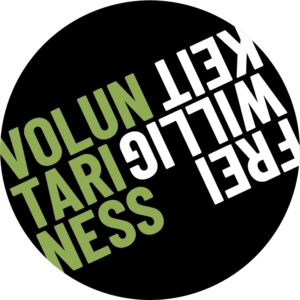By Meike Katzek
*** This post is only available in German. ***

History | Society | Theory
Voluntariness is more than voluntary civic engagement. Appeals for voluntary self-conduct, compliance, and sacrifice permeate our daily routines. For instance, we are called upon to take good care of our bodies and make the best of our lives, work overtime (because we love our jobs), or use a Corona tracing app and thus be a responsible citizen. Voluntary practices such as these are performed as acts of freedom, yet are enabled, endorsed, and sometimes demanded by manifold expectations and conditions beyond our reach. This blog explores the power structures and practices of voluntariness, while examining how people and societies are governed through it.

We probe the conditions under which this operates and how voluntariness has changed over time and in different places. Our blog is made up of individual contributions by a variety of authors. Each has their own perspective on voluntariness, and they evaluate and discuss the term in different ways. Contributions by members of the research group provide an insight into how we ourselves seek to understand voluntariness as a multifaceted analytical concept and which methodological tools we consider crucial in this regard. At the same time, we want to highlight as many perspectives on voluntariness as possible while also enabling external authors to have their say. The range of our own topics and approaches is already highly diverse and is tailored to the specific foci of our projects. Guest contributions broaden our field of vision even further, helping us to engage in critical dialogue with each other and to compare contrasting approaches.
By Meike Katzek
*** This post is only available in German. ***
By Nina Leonhard
*** This post is only available in German. ***
By Gifty Nyame Tabiri
Released in 2022, the documentary “When Women Speak” put a rare spotlight on the history of women’s activism in Ghana from the 1960s onwards. It portrays long-time activists and their struggle for the rights of women in their own voices. In our latest post, Gifty Nyame Tabiri reviews that film on the tracks of voluntariness and underscores the necessity of voluntary agency for women’s activism in a post-colonial state.
By Silke van Dyk
*** This post is only available in German. ***
By Alexander Obermüller
Securing emergency medical care, firefighting and other public emergency services has been a continuous challenge for towns and cities since the end of the 19th century. By taking us to turn-of-the-century Vienna and its Voluntary Ambulance Association, Alexander Obermüller traces the history of these challenges, examining the class status of volunteers and asking if voluntary services always had to be unpaid. Read more in our recent post.
By Maria Framke
What motives led to voluntary humanitarian aid by Indians during the two world wars? What possibilities for voluntary engagement or charitable giving existed under colonial power relations, which often confounded or even obstructed those efforts? Historian Maria Framke, who specializes in modern South Asia, explores these questions in this blog post.
By Jürgen Martschukat
Since the seventeenth century, the idea of the human being as a self-owning, autonomous, voluntarily acting agent has become deeply embedded in liberal political thought. In the neoliberal age of the last fifty years or so, this notion has shaped political and everyday action more than ever before, becoming even more profoundly entrenched in the concept of ideal subjecthood. However, this so-called Lockean subject has come in for criticism…
By Mitchell Dean and Jürgen Martschukat
In Summer 2023, Australian sociologist and Foucault expert Mitchell Dean joined our research unit as Mercator Fellow. Since then, he and our group stayed in contact and he also participates in a workshop with former Mercator Fellow Alexandra Oeser in Paris-Nanterre this month. In the meantime, he and Jürgen Martschukat once more talked about joys and challenges of researching voluntariness in our second interview with visiting scholars in Erfurt.
By Alexandra Oeser and Jürgen Martschukat
In Summer 2022, sociologist and historian from the Université Paris-Nanterre, Alexandra Oeser, joined our research unit as Mercator Fellow. Since then, a rather long-term exchange has been established. She and Jürgen Martschukat recently took the time to reflect upon the opportunities and challenges of interdisciplinary and international cooperation.

We are a group of historians, sociologists, and philosophers at the Universities of Erfurt, Jena, and Oldenburg, plus a number of associated scholars around the globe.
Together, we form the interdisciplinary Research Unit on Voluntariness, funded by the German Research Foundation (FOR 2983) since 2020. The variety of our individual research projects underscores the power, significance, and transformations of voluntariness from the Middle Ages to the present.
The Research Unit on Voluntariness is more than just our team. We are part of a growing international community of scholars who share an interest in the concept of voluntariness. We invite fellow researchers to join the discussion, not just in writing but also in person. For the next few years we are planning workshops and lecture series, and we will let you know what’s happening around voluntariness and our research unit.
Stay tuned and we’ll keep you posted about news, events, and guests as well as all sorts of sidelines! Connect with us via our social media sites on Facebook and Instagram so you don’t miss anything!

On December 1-2, 2025, a workshop organized by Florian Wagner is dedicated to the question of voluntariness and migration and return across and beyond colonial empires. The event is held at the University of Erfurt, among other contributions with a keynote lecture by Dónal Hassett.
On December 15 and 16, 2025, a workshop will be focusing on women’s voluntary activism in Ghana and other (post)colonial contexts. Starting with a film screening followed by a discussion of the 2022 documentary film “When Women Speak” a workshop on recent research perspectives and resources on Friday will discuss “Voluntariness, Women’s Activism and (Post-)Colonial Narratives.”
The 23rd International Symposium of the Ettersberg Foundation “Die sozialistische Welt und der Globale Süden” will be held at the Reithaus Weimar on November 7 and 8, 2025. It is dedicated to “interdependencies between the Socialist World and the Global South”, collecting and presenting a variety of approaches and topics. Carsta Langner from our research group will be giving a lecture on November 7.
On December 4 and 5, 2025, a workshop will be focusing on “moral history.” An evening lecture on Thursday will be held on the topic “Ökonomien der Moral.” At a panel discussion on Friday morning, we will address the question: “The Historian as Reflexive Moral Subject. New Challenge or New Normal?”
During the winter term 2025/26 we will present a film series entitled “Solidarität und Bevormundung – Die DDR und der Globale Süden.” Be invited to join us for four individual screenigs followed by discussions with special guests in Erfurt! In this post you get to the program in detail.
Under the heading “Ambivalences of Voluntariness”, Jürgen Martschukat, spokesperson of the DFG Research Unit Voluntariness, will give a brief overview of the research of our group on Tuesday, May 13, 2025, from 12:00 to 12:30 in the foyer of the research building “Weltbeziehungen” in Erfurt, as part of the series “Treppenhaus Lectures”. Feel free to drop by!
Carsta Langner, member of our research group, will present aspects of her research perspective on voluntariness and voluntary engagement among migrants in the GDR at Martin Luther University Halle-Wittenberg on Thursday, April 17, 2025.
Members of our research group have compiled a special issue for the journal Rethinking History on the topic of “The Politics of Voluntariness in Modern History.” The issue is edited by Jürgen Martschukat and Alexandra Oeser and all pieces are available for download as open access articles on the journal’s website. Get the links right here.